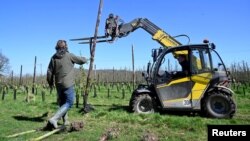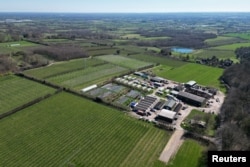Some of Britain’s fruit growers are reducing their production because it is too costly to grow their crops.
James Smith’s family has grown apples on a farm in southeastern England since 1882. But now Smith is tearing down his fields of apple trees.
Smith’s farm is in Kent. The area became known as the "Garden of England" hundreds of years ago partly because of its apples. But the crop is no longer profitable for Smith.
"I don't really want to get rid of all of my fruit, but I simply cannot see a way of overcoming all of the challenges," Smith said.
Red apple sales to large food stores, or supermarkets, have not been profitable for years, he said.
Weather and worker shortages are all problems. Inflation over the last year brought the situation to a crisis.
For 2022's crop to break even, Smith said, he needed supermarkets to pay him 20 percent more than a year earlier for each wooden crate of apples. But supermarkets offered 0.8 percent more.
The offer was the last in a series of unpleasant events for Smith.
"If I stop growing fruit I can make money," he said, explaining his plans to diversify away from apples by turning to livestock, a vineyard and a farm shop.
The government says Britain's fruit production has been decreasing since 2015. It was down 12 percent in 2021 from the year earlier. Britain imports about 85 percent of its fruit.
Supermarkets say they need to hold prices down because of the increase in the general cost of living. Food price inflation stood at a record level of 17.5 percent, the most recent industry data for March suggests.
The British Retail Consortium (BRC) is an industry group that represents supermarkets. The BRC said its members get the majority of their food from Britain. The BRC added that supermarkets know they need to pay farmers a price that will permit continued food production.
BRC's Director of Food & Sustainability Andrew Opie said, "Given the pressure on British farmers at the moment, retailers are paying more for their produce."
Smith said he has supplied all the big supermarkets over the last 10 years. But supermarkets do not pay enough, he noted.
"Retailers are completely committed to making sure we can't make any sensible profit, not even in the good years," said Smith.
By paying producers in the country so little, he believes retailers are setting up problems for the future.
If other farmers like him stop producing, Britain will depend more on imports and possibly be hurt by supply shocks.
For the farmers that continue, it will be a battle.
Richard Napier is a professor in plant and agricultural biosciences at the University of Warwick. Napier said, “Clearly a grower with no margins hasn't got the profits to invest back in the business."
In Kent, Smith is removing 80 percent of his orchards. Last year growing apples lost him $186,000. His loss would have been higher had it not been for other money he made from his land.
Last harvest's Braeburn apples have not been sold yet. Apples sit in a warehouse where they are kept at between 0.5 and 1 degree Celsius. That results in big energy costs.
Last October, Smith's monthly energy cost per kilowatt hour was 450 percent higher than in 2021. Labor costs increased 15 percent, and other materials used for apple farming increased in price as well.
Smith said turning away from apple production was the best way to make sure his family's farm survives.
He bought a juicing business for which he will continue to grow some apples. Pigs and chickens will be brought in. He also has a farm shop selling juice and other produce.
In addition to these changes, Smith is planting a vineyard and is growing small amounts of cherries.
Under Smith's plan, the garden lives on, but it is producing less food than it once did.
I’m John Russell.
Sarah Young reported on this story for Reuters. John Russell adapted it for VOA Learning English.
____________________________________________________________________
Words in This Story
get rid of –idiom to do something so that you are no longer affected by it
challenge – n. a difficult task or problem
break even – verb (phrasal) to reach the point where costs and income are equal and after which a profit can be made
crate – n. a large wooden box used for moving things or storing things
vineyard – n. a field where grapes are grown, usually for the purpose of producing wine
sensible – adj. having or showing good judgment
margin – n. an extra amount of something (such as time or space) that can be used if it is needed
warehouse – n. a large building used for storing goods







Forum